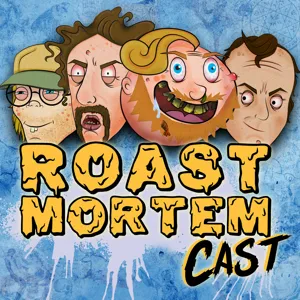Roast Mortem 2022 Countdown

Explore " global history" with insightful episodes like "Roast Mortem 2022 Countdown", "West African Griots - TWB S2 E2", "Never Such Innnocence with Lady Lucy French", "Plagues and Pandemics" and "Inventing Genocide - The Contingent Origins of a Concept During World War II - Holocaust Living History Workshop" from podcasts like ""Roast Mortem Cast", "Stories from the Hearth", "Visualising War and Peace", "Two Friends Talk History" and "Holocaust (Audio)"" and more!


In West Africa, speech goes deeper than just communication - the spoken word is imbued with the natural power to create and to give life. For centuries, West African storytellers have been advisors to kings, emperors, village elders and tribal chiefs. They have served as walking libraries, fonts of all knowledge, "the memory of humankind". And whilst the brutal slave trade of the 16th-19th centuries did its best to destroy West African culture, the legacy of the griots lives on in hip-hop, poetry and activism to this very day.
This is Part Two in the second season of Stories from the Hearth's bonus historical and interview series: The Wandering Bard. Each season of The Wandering Bard examines a different aspect of the history and nature of storytelling, as well as people behind it. In season two of The Wandering Bard, we ask the question “Who are the storytellers?”, and in today's episode, we examine the Griots of West Africa.
The next episode in The Wandering Bard series will take a look at the shadow puppetry of ancient China.
Stories from the Hearth is an experimental storytelling experience ft. truly original fiction and thoughtfully produced soundscapes. The aim of this podcast is to rekindle its listeners' love for the ancient art of storytelling (and story-listening), and to bring some small escapism to the frantic energies of the modern world. Stories from the Hearth is the brainchild of queer punk poet, environmentalist, and anarchist Cal Bannerman. Vive l'art!
Support the podcast and get early access, exclusive content, bonus story-episodes, in-episode shout-outs, and the chance to become part of a wider community, by visiting my Patreon: https://www.patreon.com/storiesfromthehearthpodcast
Today's sources: The Culture Trip, Cultures of West Africa, TEDxUnilorin, and Green Global Travel
Sirata by Habib Koité - listen here!
Instagram: @storiesfromthehearth
Twitter: @Hearth_Podcast
YouTube: Stories from the Hearth
Email: storiesfromthehearthpodcast@gmail.com
Fire Daemon Character Artwork by Anna Ferrara
Anna's Instagram: @giallosardina
Anna's Portfolio: https://annaferrara.carbonmade.com/
Thank you for listening. Please consider following, subscribing to, and sharing this bonus episode, and please do tell your friends all about Stories from the Hearth.

In this episode, Alice and Nicolas interview Lady Lucy French, OBE, about Never Such Innocence, a charity she founded in 2014 to give children and young people a voice on conflict. Participants come from all around the globe and they use art, public speaking, poetry and song to share how they feel about war and its impacts. Through workshops, community events and public award ceremonies, Never Such Innocences ensures that these young voices are heard by politicians, policy-makers and Armed Forces personnel, among others; world leaders have even begun to sit up and take notice. We are excited to share what we learnt about Never Such Innocence's mission and how they have been empowering children to change the ways we visualise war and peace.
Among other questions, we asked:
If you would like to see the images or read the full poems discussed in this podcast episode, you can find bonus material on our project blog. For a version of our podcast with close captions, please visit https://www.youtube.com/watch?v=85kTUV6BqUU. To get in touch with the Never Such Innocence project or find out more about their past work and upcoming aims, please have a look on their website.
For more information about individuals and their projects, access to resources and more, please have a look on the University of St Andrews Visualising War website.
Music composed by Jonathan Young
Sound mixing by Zofia Guertin

Join us for our first ever episode. Zofia focuses on the Antonine plague that struck the Roman Empire during the 2nd century CE as well as the story of Glycon, the original snake oil man. Liam explores how the concoction of deadly diseases and viruses that Europeans brought to the New World resulted in catastrophic consequences for the peoples and societies of the Americas. Tangents include: appropriate wigs for magic snakes, prophetic octopi, who REALLY 'discovered' the Americas and the question everyone is asking: do snakes control Trump?
Find us on Instagram
Support us through Patreon
Buy our merch on Redbubble
Music by the wonderfully talented Chris Sharples
If you'd like to get in touch, email at twofriendstalkhistory@gmail.com
















Stay up to date
For any inquiries, please email us at hello@podcastworld.io